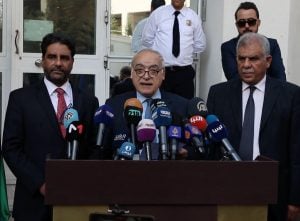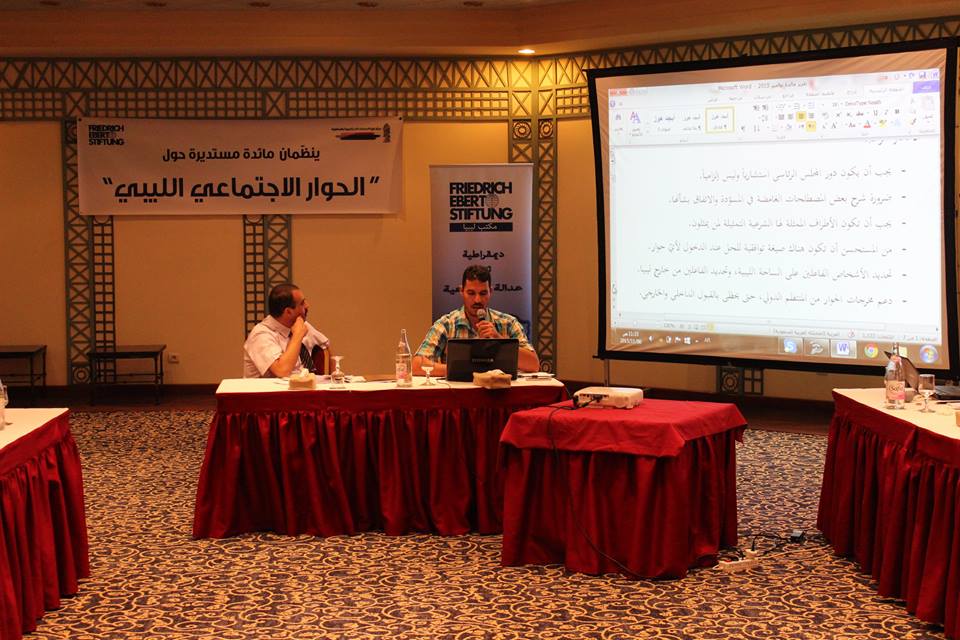By Sami Zaptia.

London, 23 October 2017:
On the sixth anniversary of Libya’s ‘‘liberation day’’ from the Qaddafi regime, Libya’s new political elite is still unable to reach agreement on some sort of social contract that would take the country out of its debilitating interim period.
On Saturday, talks in Tunis between the protagonists came to an end as the parties returned to Libya for further consultation. At the end-of-talks press conference, UNSMIL head Ghassan Salame stressed that there was disagreement and ‘‘bottlenecks’’ on many points, including the vexing article 8, but that there was also progress on many points too.
Salame promised that UNSMIL will draft the points of agreement and disagreement. It was not clear if this would be published to the general public or if it will be an internal working document only for the negotiators. The stress on putting onto paper what was and was not agreed upon came on the back of last week’s disagreement that parties were agreeing on some issues verbally within the negotiations, but then backtracking on them later on.
The hiatus in talks comes two days before today’s public holiday in Libya marking six years since Qaddafi’s death (20th October) and the announcement of liberation day from the Qaddafi regime.
Today, UNSMIL congratulated ‘‘the Libyan people on the anniversary of the Declaration of Liberation’’ and added that it optimistically ‘‘hopes by this time next year, presidential and legislative elections would have taken place, ending the period of successive transitions and uncertainty and ushering in peace, security and prosperity’’.
On Saturday at the press conference UNSMIL said that it ‘‘will continue to be actively engaged in efforts to implement the various components of the Action Plan presented by the Special Representative on 20 September 2017 and adopted by the Security Council. The Plan which culminates in free and fair elections within one year from its announcement aims at moving Libya out of the current political impasse and usher in a better future for the next generations.’’
Salame also stressed his hope that the protagonists would rise above their own narrow interests and prioritize the greater interest of the Libyan people. However, as both parties continue to hide behind fig leaves of disputed legitimacy, there is even more loss of trust in both parties by the Libyan public – if that is at all possible.
There is a growing feeling that the two sets of political elites are too immersed and hostage to their own self-interests and supporters to rise to the occasion and save the country from the impending doom.
There are now calls for the international community to show sincerity in holding elections by next September – as set out in the 20 September Action Plan approved by the Security Council.
It is felt that since both sets of political elites are, by Libyan standards at least, handsomely paid as members of the House of Representatives (HoR) or the High State Council (HSC), and are quite happy to progress at a snail’s pace in the dialogue process while the country withers. It is felt that open ended negotiations would put no pressure on the negotiators to reach agreement and that the specter of elections and loss of political position, power, prominence and salary might act as catalyst to an earlier agreement.
While there are many genuine objections to the holding of elections in the absence of: true national political and social reconciliation; a lack of security or centralized national security apparatus to safeguard elections; the failure to agree to a constitution and; the lack of a secure space for civil society and candidates for elections to debate and interact with the public freely – many now see elections as the only way out of Libya’s political impasse.
It is true that, on the one hand, the ushering in of yet another new set of inexperienced parliamentarians could only lead to an action replay of the GNC and the HoR. However, many now believe that this set of political elites have run their course. They have had a considerable period of time to think outside the box and reach some kind of political compromise and agreement to save Libya.
On the other hand, many now see that the rump of the GNC and the current HoR members have not shown genuine urgency in trying to extricate Libya from its impending doom and gloom. Too many of them – but to be fair by no means all of them – are too comfortable with their high salaries, housing and armored car and travel allowances to identify with those who elected them.
Many members of the public feel that their political representatives do not feel the daily threats of insecurity, kidnapping, theft, robbery and hijacking they are experiencing. They do not feel they suffer enough from the frequent power and water cuts, gas cylinder and petrol shortages nor the cash shortages at banks or inflation and extraordinary high prices they suffer.
The public feel that the political elite are not concerned enough about the skyrocketing black-market price of foreign exchange which for most of them has made the option of seeking medical help even in Tunis unattainable.
As the general public increasingly see their own camps become isolated caricatures of their genuine political views, the need to go back to the electorate as the ultimate reference point for Libyan politics is increasingly becoming the ultimate guillotine to an eternity of transitional uncertainty.
Whilst the HoR was indeed the last democratically elected Libyan parliament in 2014, many feel that it has become too isolated, divided and self-interested to compromise and salvage the country out of its near total collapse. It has lost its moral high ground and lost sight of its national responsibility to lead the country out of its fast approaching apocalypse.
Meanwhile, the HSC, made up of the unelected rump of the General National Council (GNC) seems more interested in increasing its size and membership than saving Libya from near disaster.
The recent World Bank report
https://www.libyaherald.com/2017/10/13/world-bank-libya-report-violent-political-conflict-deficits-inflation-and-lack-of-reform-framework-stall-economy/
on Libya has made it clear that Libya’s economic situation is fast approaching bankruptcy if it continues to outspend its revenues. Libya is fast depleting its national foreign currency reserves while oil production has struggled to pass the one-million-barrel mark to either reduce or cancel its growing and recurring budget and trade deficits.
Libya’s political elite – including its tribes and militias – do not have an indefinite period of time in order to reach a political compromise at their pleasing. The clock is ticking and Libya is falling deeper and deeper into political, economic and financial ruin by the day.
It has been six years since the death of Qaddafi and the collapse of his regime. It is time for patriotic politicians with a vision of national salvation to emerge in the hour of need. Negotiations cannot continue indefinitely.








